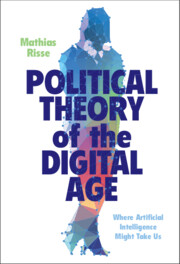Book contents
- Political Theory of the Digital Age
- Political Theory of the Digital Age
- Copyright page
- Dedication
- Contents
- Preface
- Acknowledgments
- 1 Introduction
- 2 Learning from the Amish
- 3 Artificial Intelligence and the Past, Present, and Future of Democracy
- 4 Truth Will Not Set You Free: Is There a Right to It Anyway?
- 5 Knowing and Being Known
- 6 Beyond Porn and Discreditation
- 7 The Fourth Generation of Human Rights: Epistemic Rights in Life 2.0 and Life 3.0
- 8 On Surveillance Capitalism, Instrumentarian Power, and Social Physics
- 9 Data as Social Facts: Distributive Justice Meets Big Data
- 10 God, Golem, and Gadget Worshippers: Meaning of Life in the Digital Age
- 11 Moral Status and Political Membership: Toward a Political Theory for Life 3.0
- Epilogue
- Bibliography
- Index
4 - Truth Will Not Set You Free: Is There a Right to It Anyway?
Elaborating on the Work Public Reason Does In Life 2.0
Published online by Cambridge University Press: 02 February 2023
- Political Theory of the Digital Age
- Political Theory of the Digital Age
- Copyright page
- Dedication
- Contents
- Preface
- Acknowledgments
- 1 Introduction
- 2 Learning from the Amish
- 3 Artificial Intelligence and the Past, Present, and Future of Democracy
- 4 Truth Will Not Set You Free: Is There a Right to It Anyway?
- 5 Knowing and Being Known
- 6 Beyond Porn and Discreditation
- 7 The Fourth Generation of Human Rights: Epistemic Rights in Life 2.0 and Life 3.0
- 8 On Surveillance Capitalism, Instrumentarian Power, and Social Physics
- 9 Data as Social Facts: Distributive Justice Meets Big Data
- 10 God, Golem, and Gadget Worshippers: Meaning of Life in the Digital Age
- 11 Moral Status and Political Membership: Toward a Political Theory for Life 3.0
- Epilogue
- Bibliography
- Index
Summary
We first explore how damaging untruth can be, especially in digital lifeworlds. In digital lifeworlds information spreads at a pace and volume unheard of in analog contexts. But misinformation and disinformation spread the same way, which enhances how individuals can tell stories about themselves or have them substantiated in echo chambers in the company of likeminded people. These considerations provide support for a right to truth. However, next we see that untruth plays a significant role as an enabler of valued psychological and social dynamics. The considerations that pull into the opposite direction notwithstanding, there can therefore be no comprehensive right to truth. Contrary to a well-known Bible verse, for most people it is anyway not the truth that sets them free. It is acceptance of worldviews in likeminded company that does so (worldviews that tend to contain plenty of untruths), in any event if being set free means having an orientation in the world. But that there can be no such comprehensive right is consistent with there being a right to truth in specific contexts. Still, the moral concern behind truthfulness is in this context not best captured in terms of an actual right to truth.
- Type
- Chapter
- Information
- Political Theory of the Digital AgeWhere Artificial Intelligence Might Take Us, pp. 73 - 95Publisher: Cambridge University PressPrint publication year: 2023

